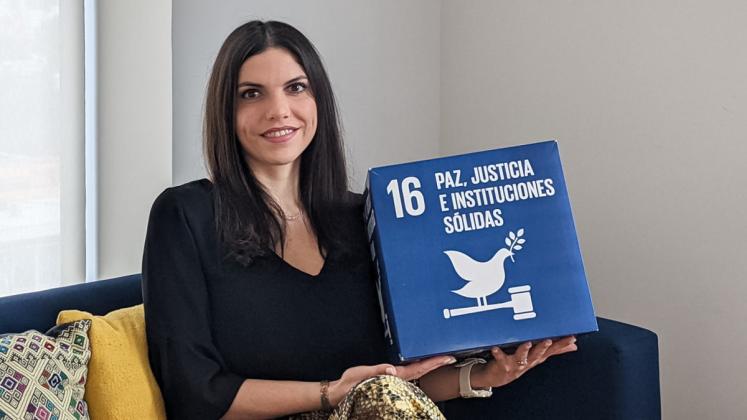On 11 July 2024, UNU will host “Global AI Governance: The Risks of Artificial Intelligence to International Peace and Security”, a conversation with Jimena Sofía Viveros Álvarez, member of the United Nations Secretary-General's High-Level Advisory Body on Artificial Intelligence (AI). This event will start at 18:30 in the 2F Reception Hall at UNU Headquarters in Tokyo.
AI is increasingly being incorporated into broader security domains without any constraints or mechanisms to ensure its safe and responsible use. This poses catastrophic and existential risks, threatening international peace and security and humanity as a whole. The effective governance of these technologies requires a centralized authority with the appropriate functions to elaborate and implement norms, standards and guidelines, provide capacity-building for States to cope with AI’s challenges, as well as the necessary oversight, monitoring, verification and validation, enforcement, accountability, remedies for harm, and emergency response mechanisms.
Jimena Viveros will join UNU Chief of Staff Michael Baldock for a conversation delving into the need for binding norms within AI’s global governance to prevent and mitigate the inherent risks of AI while ensuring its peaceful uses for the benefit of humanity. What risks does AI pose to international peace and security? What form does an international institution that can foster the peaceful and responsible use of AI take? How can such an institution ensure compliance by Member States?
The UNU Conversation Series aims to foster audience participation; you are encouraged to engage with the speakers during the conversation and at the reception that will follow, where all event attendees are invited to enjoy hors d’oeuvres and drinks while exchanging ideas and making new contacts.
Please note that this event will be in English. Advance registration (by 10 July) is required. Please click on the REGISTER button above to access the online registration page.
Please be prepared to present identification at check-in.
About the Speaker
Jimena Sofía Viveros Álvarez is a distinguished lawyer and scholar, member of the United Nations Secretary-General's High-Level Advisory Body on Artificial Intelligence (AI), tasked with advancing recommendations for the global governance of AI. Additionally, she is a Commissioner within the Global Commission on Responsible AI in the military domain, and an AI expert for the Organization for Economic Co-operation and Development (OECD), participating in the working groups on AI risks and accountability, as well as in the group on AI incidents. In Mexico, she serves as Chief of Staff and Head Legal Advisor of Justice Loretta Ortiz Ahlf, in Mexico's Supreme Court of Justice, and previously held the same position at the Federal Judicial Council.
Her prior roles include national leadership positions at the Ministry of Security and Civilian Protection, and at the Federal Tax and Finance Prosecutor’s Office, serving at the level of Director General. Internationally, she has worked at the International Criminal Court, the International Criminal Tribunal for the former Yugoslavia, the International Criminal Tribunal for Rwanda, the Organization for the Prohibition of Chemical Weapons, and the United Nations Verification Mission in Colombia for the disarmament of FARC. She has also worked for the Lebanese Supreme Court, in addition to NGOs in Kenya, Cambodia and Palestine.
Ms. Viveros acquired her law degree at the Iberoamerican University in Mexico City and obtained her LL.M. in Public International Law from Leiden University. Currently, she is finalizing her doctoral thesis at Cologne University, supervised by Dr. Claus Kreß, on the impact of AI and autonomous weapons systems on the international peace and security law and policy framework with concrete propositions to achieve global governance from different legal perspectives.



